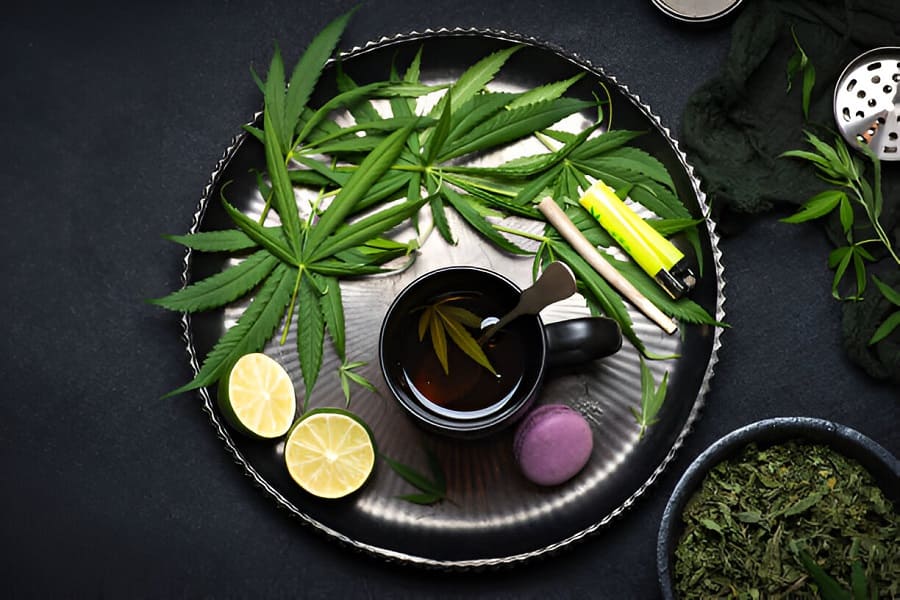
Edibles are generally considered safer than smoking cannabis in terms of respiratory health. When you smoke, you inhale harmful chemicals and tar, which can irritate your lungs and increase the risk of respiratory problems. Edibles, on the other hand, are ingested and metabolized by the liver, bypassing the lungs entirely. However, edibles also pose unique risks. They can take longer to take effect, which can lead to accidental overdosing if users consume more before the initial effects are felt. Edibles can also produce more intense and prolonged effects compared to smoking, especially for those new to cannabis. Brief overview of cannabis consumption methods:
- Smoking: The most common method, involving inhaling smoke from joints, blunts, or pipes.
- Vaping: Involves heating cannabis concentrates or flower to create vapor, which is then inhaled.
- Edibles: Food or beverages infused with cannabis, such as gummies, chocolates, or drinks.
- Topicals: Creams, lotions, or oils applied directly to the skin.
- Sublingual: Products placed under the tongue for absorption.
It’s important to note that no consumption method is completely risk-free. The safest approach is to consult with a healthcare professional before starting any new cannabis regimen, especially if you have underlying health conditions. It effectively highlights the trade-offs between cannabis edibles and smoking, acknowledging the benefits of edibles while recognizing that smoking remains a prevalent method with its own factors to consider. Would you like to explore any specific aspects of this topic in more depth? For example, we could discuss:
- Health implications: Comparing the potential health risks and benefits of each method.
- Efficacy and onset of effects: How quickly and intensely each method produces effects.
- User preference and experience: Factors that influence individual choices and experiences.
- Legal and social considerations: The legal status and social acceptance of each method in different regions.
Cannabis Edibles: A Closer Look
How Edibles Work
Unlike smoking or vaping, which deliver THC directly to the lungs, edibles are metabolized by the liver. This process can take anywhere from 30 minutes to a few hours, leading to a delayed onset of effects compared to other methods. Once metabolized, THC enters the bloodstream and interacts with the body’s endocannabinoid system.
Advantages of Edibles
- Discreet consumption: Edibles offer a discreet way to consume cannabis, as there’s no visible smoke or vapor.
- Longer-lasting effects: The effects of edibles can last significantly longer than those of smoking or vaping, providing sustained relief for conditions like chronic pain or anxiety.
- Potential for targeted dosing: Edibles can be consumed in smaller doses, allowing users to gradually increase their intake and find their optimal dosage.
Potential Drawbacks
- Delayed onset of effects: As mentioned earlier, the delayed onset of effects can lead to accidental overconsumption if users don’t wait for the initial effects to kick in.
- Risk of overconsumption: Because edibles can take longer to produce effects, users may consume more than intended, leading to unintended consequences like anxiety or paranoia.
- Legal considerations: The legality of cannabis edibles varies widely from country to country and even state to state. It’s essential to be aware of local laws and regulations before purchasing or consuming edibles.
In conclusion, while cannabis edibles offer several advantages, it’s crucial to understand their unique characteristics and potential drawbacks. By being informed and responsible, users can enjoy the benefits of edibles while minimizing the risks associated with their consumption.
Smoking Cannabis: Traditional and Popular
Inhalation Methods
- Joints: Rolled paper cones filled with ground cannabis and often tobacco.
- Pipes: Small, hollow devices used to smoke cannabis.
- Blunts: Cigar wraps filled with cannabis, often pre-rolled for convenience.
Advantages of Smoking
- Immediate effects: Smoking provides the most rapid onset of effects, making it a popular choice for those seeking immediate relief.
- Social aspect: Smoking cannabis can be a social activity, fostering connections and shared experiences.
- Flavor and aroma: Different strains of cannabis offer unique flavors and aromas, which can be enjoyed through smoking.
Potential Drawbacks
- Health risks associated with inhalation: Smoking cannabis, like any other form of smoking, can lead to respiratory problems such as bronchitis, chronic obstructive pulmonary disease (COPD), and increased risk of lung cancer.
- Secondhand smoke exposure: Exposure to secondhand cannabis smoke can have negative health consequences for those who are not consuming the drug, particularly for individuals with respiratory issues.
- Legal restrictions: The legality of smoking cannabis varies widely from place to place. It’s essential to be aware of local laws and regulations before engaging in this activity.
In conclusion, while smoking cannabis remains a popular method of consumption, it’s important to be aware of the potential health risks associated with inhalation. For individuals seeking a safer alternative, edibles or vaping may be more suitable options.
Comparing the Two: Safety Factors
Health Implications
- Short-term effects: While both methods can lead to immediate effects like relaxation, euphoria, and altered perception, smoking typically produces quicker and more intense results due to direct inhalation. Edibles, on the other hand, can take longer to take effect.
- Long-term effects: The long-term health risks of cannabis consumption are still being studied, but both smoking and edibles can contribute to respiratory problems, especially if used frequently.
Cardiovascular Risks
- Smoking: Smoking cannabis can increase heart rate and blood pressure, potentially raising the risk of cardiovascular events in susceptible individuals.
- Edibles: While edibles generally have a lower impact on the cardiovascular system compared to smoking, excessive consumption can still lead to adverse effects.
Respiratory Issues
- Smoking: Inhaling cannabis smoke can irritate the lungs and increase the risk of respiratory conditions like bronchitis and chronic obstructive pulmonary disease (COPD).
- Edibles: Edibles do not directly affect the lungs, but excessive consumption can still lead to indirect respiratory issues due to potential side effects like nausea or vomiting.
Cancer Risk
- Smoking: Smoking cannabis, like tobacco, has been linked to an increased risk of lung cancer, particularly when combined with tobacco smoking.
- Edibles: There is no direct evidence linking cannabis edibles to an increased risk of cancer.
Toxicity
- Potency and dosing: The potency of cannabis products can vary widely, making it difficult to accurately control dosage. This is especially true for edibles, which can have delayed and more intense effects.
- Risk of overdose: While it’s rare to overdose on cannabis, excessive consumption of edibles can lead to adverse effects like anxiety, paranoia, or psychosis.
Legal Considerations
- Varying laws and regulations: The legal status of cannabis varies significantly from country to country and even state to state. It’s essential to be aware of local laws and regulations regarding possession, consumption, and cultivation of cannabis.
- Possession, consumption, and cultivation: The laws governing the possession, consumption, and cultivation of cannabis can be complex and subject to change. Individuals should research the specific laws in their jurisdiction to avoid legal consequences.
In conclusion, both smoking and consuming cannabis edibles involve potential health risks. While edibles may offer certain advantages, such as reduced respiratory irritation, both methods can have long-term health consequences. It’s essential to weigh the potential benefits and risks before choosing a consumption method and to adhere to local laws and regulations.
Conclusion This analysis has explored the comparative safety of cannabis edibles and smoking, examining factors such as health implications, toxicity, and legal considerations. Key points to remember include:
- Edibles offer potential advantages like discreet consumption and longer-lasting effects, but they can also pose risks due to delayed onset and the potential for overconsumption.
- Smoking remains a popular method despite its associated health risks, which can include respiratory problems and increased cancer risk.
- Both methods involve potential health hazards, and the choice between them should be based on individual preferences and circumstances.
In summary, while cannabis edibles may offer certain advantages, smoking remains a popular choice with its own set of considerations. It is crucial to weigh each method’s potential benefits and risks before making an informed decision. Further research is needed to fully understand the long-term health implications of cannabis consumption, particularly regarding edibles and their potential effects on different individuals. Responsible consumption is essential for minimizing risks and maximizing benefits. Individuals should be aware of local laws and regulations, start with low doses, and consult with a healthcare professional if they have any concerns.
The Role of Cannabis in Medical Treatment
- Therapeutic use: Cannabis is effective in treating conditions like chronic pain, anxiety, epilepsy, and multiple sclerosis.
- Dosage and administration: Determining the optimal dosage and method of administration for medical cannabis can be challenging.
- Legal and regulatory issues: The legal status of medical cannabis varies widely, and there are ongoing debates about its regulation and accessibility.

